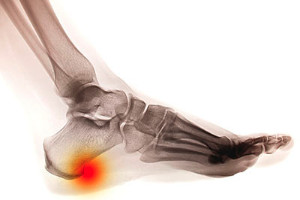 When there is excessive stress in the heel, new bone is formed to protect the heel against fractures. This is known as a heel spur and often feels like a bump in the heel. It typically begins as cartilage and then progresses into solid bone. They’re present in about half the population, although not everyone has pain. The most common cause of heel spurs is plantar fasciitis. If pain is experienced, it’s usually in the morning or after resting. Typically, after the first few steps, the pain will improve as the foot gets used to the movements. Certain exercises may also help relieve the pain. Placing the affected foot on a tennis ball while rolling it around may be beneficial in relaxing the muscles. Additionally, bending the knees while moving up and down may provide additional relief.
When there is excessive stress in the heel, new bone is formed to protect the heel against fractures. This is known as a heel spur and often feels like a bump in the heel. It typically begins as cartilage and then progresses into solid bone. They’re present in about half the population, although not everyone has pain. The most common cause of heel spurs is plantar fasciitis. If pain is experienced, it’s usually in the morning or after resting. Typically, after the first few steps, the pain will improve as the foot gets used to the movements. Certain exercises may also help relieve the pain. Placing the affected foot on a tennis ball while rolling it around may be beneficial in relaxing the muscles. Additionally, bending the knees while moving up and down may provide additional relief.
Heel spurs can be incredibly painful and sometimes may make you unable to participate in physical activities. To get medical care for your heel spurs, contact Donald Manger, DPM from Associated Podiatric Physicians, PA. Our doctor will do everything possible to treat your condition.
Heels Spurs
Heel spurs are formed by calcium deposits on the back of the foot where the heel is. This can also be caused by small fragments of bone breaking off one section of the foot, attaching onto the back of the foot. Heel spurs can also be bone growth on the back of the foot and may grow in the direction of the arch of the foot.
Older individuals usually suffer from heel spurs and pain sometimes intensifies with age. One of the main condition's spurs are related to is plantar fasciitis.
Pain
The pain associated with spurs is often because of weight placed on the feet. When someone is walking, their entire weight is concentrated on the feet. Bone spurs then have the tendency to affect other bones and tissues around the foot. As the pain continues, the feet will become tender and sensitive over time.
Treatments
There are many ways to treat heel spurs. If one is suffering from heel spurs in conjunction with pain, there are several methods for healing. Medication, surgery, and herbal care are some options.
If you have any questions feel free to contact our office located in Hamilton Township, NJ . We offer the latest in diagnostic and treatment technology to meet your needs.
